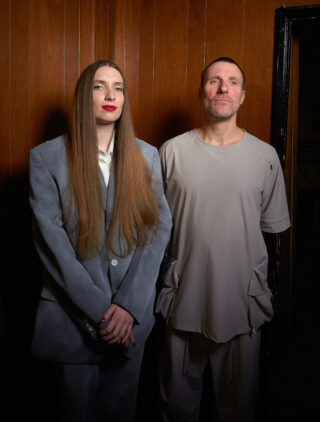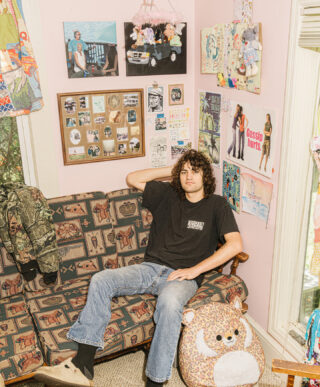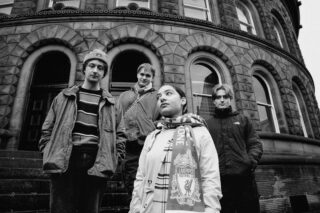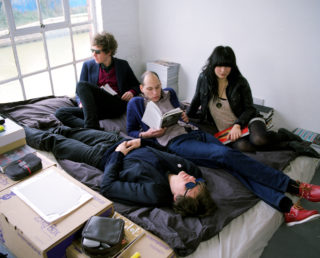
Like any hot, hype-generating new band that fails to come up with a cure for cancer, Crystal Stilts are getting a bit of flack. The source of this tellingly aggrieved huffing and puffing isn’t the kids upping their Myspace plays, it’s brooding, old music journos blogging-away, essentially still jealous that yet another band have done what their undergraduate outfit Electric Clangers never did and got themselves a following. Ironically enough, for those who sneer at whatever fashionable new wagon has a band riding it, it’s pretty fashionable right now to talk down Crystal Stilts as ’86-fixated Mary Chain rip-offs who don’t know their Liverpool sound from their Merseybeat. In a lazy effort to catalogue them and triangulate their influences, much of their content as a band has been overlooked. This substance reveals itself in twenty minutes in a deserted bar opposite Barden’s Boudoir, where they’re on in an hour.
Singer Brad Hargett and drummer/one-time Vivian Girl Frankie Rose start by clearing up on the twin issues of sound-pinching and being the cool new thing.
“It’s not necessarily a shoegaze thing,” says Hargett, as if naming the genre again will give him a stroke “that sound exists on old records. We wanted to make the record sound like how we like records to sound, which is very mono with everything sort of washing in and out of itself. A lot of 50s records are like that. We feel like we also get grouped-in with a lot of lo-fi stuff but we recorded that record [debut long player ‘Alight of Night’] on two-inch reel to reel! We just use a lot of reverb; big plates and springs and stuff.”
They are predictably and reassuringly deadpan about the ‘cool’ thing too:
“It’s funny,” says Rose “cause we’ve been kind of tagged as this kind of fashionable band… and I’ve been wearing this outfit for four days straight. And when we have to do photo shoots, I don’t think any of us find it glamorous, like tonight I ate a veggie burger at the Ali Baba café and we’re staying at Travelodge.
“If people think we’re cool then that’s fine, but I don’t wake up in the morning and think ‘Hey! People think I’m cool’. It doesn’t make me feel any better.”
A subtler criticism of the band is born out of the relationship between British and American alternative music scenes, a relationship that’s been fairly one-way since a glut of Brooklyn and L.A. bands persuaded Pens to pick up guitars and Peaches Geldoff to move house. These particular Brooklynites are rare in that they are overtly influenced by England’s pop heyday of the 80s, making John Peel and Factory fanatics look for the nearest hobbyhorse.
“The Smiths, The Jesus and Mary Chain and even Joy Division are big influences but I think those comparisons come from having a limited vocal range more than anything,” confesses Hargett. “Like, you do the most with these three notes that you can hit. People have said that I sing with an English accent and I do not sing with an English accent at all. Mary Chain or Joy Division, they don’t sing with an English accent. When I think English accent I think of early Pink Floyd or The Kinks. To me it’s just the music that I’m into, a lot of that music’s British, but a lot of it’s American too.”
For the band, the shiny flipside of the disparaging column inches and blog splurges is a very nearly sold out European tour, culminating, for the UK leg at least, in this hipstergasm of a gig in Barden’s. It’s a buzzing show not only because it’s hugely oversold, nor due to a hovering Alex Kapranos, or the room creaking with a will-it-be-shit?-tension, but because, once they come on stage, they quickly give preconceptions two fingers, proving that 1. they do have a direction and 2. they were miscast as the valium-scoffing poster-boys of downbeat melancholia. The album the crowd has memorised at home was made three years ago and things have understandably moved on a lot, so the set, littered with organ flourishes and reminiscent of early BJM’s 60s-revivalism, comprises of so much new material that they apologise twice.
Anyone who’d come planning to hang themselves later will have been sorely disappointed but for those who’d seen earlier shows there was fore-warning.
“When you look at the new songs that we’re playing a lot of actually on this tour,” says Rose, “it’s pretty danceable, happy even.”
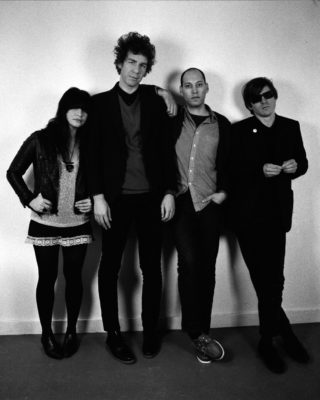
Despite new upbeat tunes, Hargett still gives a good account for his more miserable numbers and his key-evasive, lost-in-a-wind-tunnel delivery.
“I can’t relate to like scream-y stuff, you know, even in an emotional way. I feel like being upset sounds like Leonard Cohen and not someone yelling at the top of their lungs. Generally if I’m sad I don’t have the energy to really complain about it in that way. In reviews there’s a lot of drug references, like ‘I sing like this guy on drugs’. I mean I don’t know, I’m not an overly excitable person I guess… I don’t really think any of us are.
“In terms of it being druggie it has more to do with us thinking that music is like a drug and we’d like it to give you that feeling, to make you feel part of it, like you could swim in it or something. I think the best songs you can kind of latch onto in a melancholic way, but they’re also a release. There’s a very fine line between sadness and that release, and if you can kind of walk the line and touch on both those feelings then that’s the best music”
The mention of swimming prompts a question about the sense of underwater-like displacement that pervades ‘Alight of Night’’s lyrical themes, its music and its reverb-heavy production.
“I think that’s just us trying to communicate how we feel that life can be like, you know? A lot of these songs were written when we first moved to New York. We were surrounded by this city and it was pretty overwhelming – in a good way though – it can be sort of ecstatic if you take a step back from yourself and just soak everything in. Even taking a train through the city and seeing everything fly past, getting out and walking through a sea of people, it can all be really intoxicating.”
This feeling takes on socio-political extensions too (previously overlooked depth ahoy!) as a conversation about the nature programme the bar is curiously screening leads us to the difference between US and UK TV ads.
“It was particularly strange that after 9/11 the most patriotic thing you could do was buy a car. The TV was like, ‘if you’re patriotic; buy a car’. It was kind of nauseating. I think all of us in the band feel isolated from the cultural zeitgeist, that is like going to the mall and buying shit.”
“Over-consumption, consumerism, all those wonderful things Americans are known for,” adds Rose “I mean, in New York you don’t have to deal with it, you have friends that aren’t like that, but you just feel very removed from American Culture and embarrassed by it. I actually sequenced the record so that there’s a trajectory of trying to remove yourself from an environment and finding some sort of better reality in yourself.”
That hunt for meaning has, so far, gotten them a fair bit of attention, and whatever it is they’re looking for exactly, you’d be one cruel blogger to begrudge them an escape from their crappy coffee shop jobs.




